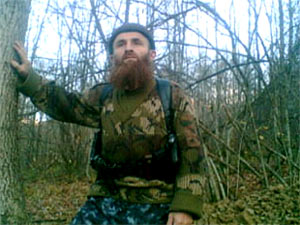
Rights Group: Chechen Students Deported from Egypt Face Torture
Publication: Eurasia Daily Monitor Volume: 6 Issue: 118

The son of a top Chechen rebel commander was reportedly among six students from Russia who were supposed to be deported from Egypt on June 18. According to Western media reports, two of the six, including Maskhud Abdullaev, son of rebel commander Supyan Abdullaev, did not make it to the Russia-bound plane, but they are still scheduled for deportation. Meanwhile, Amnesty International warns that the deported Chechen students could face torture or other forms abuse in Russia.
Agence France-Presse reported that a traffic jam prevented police from taking Maskhud Abdullaev to an airport in Cairo from reaching it in time to make the Moscow-bound plane he was supposed to be put on. The news agency quoted a friend of Abdullaev, Ruslan Mussayev, as saying that Abdullaev does not want to go to Russia because "there is a problem for him there" (Agence France-Presse, June 18).
Maskhud’s uncle, Ruslan Abdullaev, told the Reuters news agency in Cairo that Maskhud and another student, identified by Amnesty International as Akhmad Azimov, missed their flight to Moscow because the officer transporting them to the airport drove to the wrong terminal. He said that the two students had been asked to buy new tickets for a later flight to Moscow, but did not have enough money, adding they would probably be deported on June 19. Ruslan Abdullaev told Reuters he feared his nephew would be held hostage to put pressure on his relatives among Chechen rebels to surrender, adding that Maskhud left Chechnya as a child and had nothing to do with the conflict there.
The Chechens who are being deported from Egypt were students at Cairo’s al-Azhar University and, according to Amnesty International, all claimed refugee status in Azerbaijan before moving to Egypt to study but have not been allowed to fly to Azerbaijan. The human rights group says about 35 Russian students, most of them from Chechnya, Ingushetia and Dagestan, were arrested in May during a wave of detentions of foreign students at al-Azhar last month (Reuters, June 18).
According to AFP, the students were rounded up for suspected links to an alleged al-Qaeda cell responsible for a February 22 bombing in Cairo’s tourist district which killed a French teenager. Amnesty International reported four students who were arrested in the sweep were deported to Russia on June 9, where Russian and Chechen security forces handcuffed them and took them away on arrival. According to Amnesty, one of the four has since disappeared and is believed to have been moved to Chechnya (Agence France-Presse, June 18).
Gazeta.ru quoted an al-Azhar student from the North Caucasus who was arrested by Egyptian authorities last month, identified simply as Asvad, as saying that the arrested students had been kept in small cells packed with 50-60 people where it was impossible to lie down or even sit. He said that the Egyptian special services had tried to elicit "provocative information" from the detained Chechen students, implying that if Chechens were involved in killing Russians at home, maybe they were involved in killing people in Egypt. He said the first group of detained students was released from prison after three days and another group was released after five days, and that besides students from Russia, they included students from France, England, other European countries and even Tajikistan. He also said that Egyptian security agents had not returned money seized from them during their arrests (www.gazeta.ru, June 18).
Earlier this month, Kavkazsky Uzel quoted Asvad Kharikhanov, a Chechen student arrested in Egypt on May 27, as saying that Egyptian authorities had interrogated him about whether he belonged to any extremist organizations (www.kavkaz-uzel.ru, June 1).
Gazeta.ru on June 18 quoted an unnamed friend of Maskhud Abdullaev as saying he was worried about what would happen to Maskhud after he is deported to Russia: "You know what the practice is: those who have family connections with Chechen militants are usually detained right away, their parents are blackmailed, exchanges are proposed. It is 99 percent certain that Maskhud is threatened with [the] same fate" (www.gazeta.ru, June 18).
According to Kavkazsky Uzel, Maskhud Abdullaev’s father, Supyan Abdullaev, is second from the top in the hierarchy of the Chechen/North Caucasus separatist movement and could succeed Chechen rebel leader Dokka Umarov as "emir" of the "North Caucasus Emirate" if Umarov is killed.
The website described Supyan Abdullaev, born in Kazakhstan in 1956, as "one of the most irreconcilable radicals" among the rebels of the North Caucasus. One of the founders of the Islamic Rebirth Party during the Soviet period, Supyan Abduallev headed the Ar-Risalah Islamic center in Grozny prior to 1994. During the first Chechen war (1994-1996), he headed a small group of rebel fighters and by the end of that war had become commander of the so-called Islamic Battalion.
By the summer of 2002, Supyan Abdullaev had become a member of the so-called State Defense Committee (GKO) and of the Military Committee GKO-Madzhilisul Shura of the separatist Chechen Republic of Ichkeria (ChRI), and was subsequently named ChRI Minister of Finance. In the autumn of 2003, he was put in charge of the Shali area of the ChRI’s Eastern Front and in 2007 was named ChRI vice president (www.kavkaz-uzel.ru, June 9).




